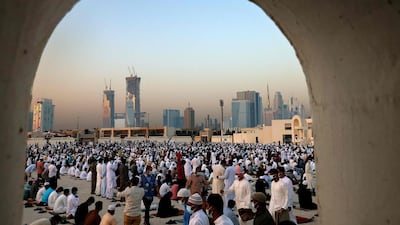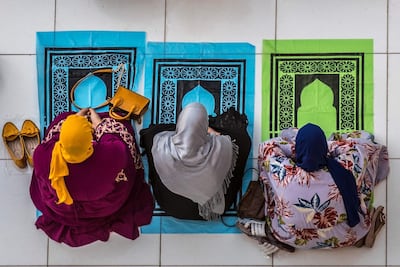On the morning of Eid Al Fitr one of the first acts is to make the donation of zakat, the charitable giving for the breaking of the fast. Even before Eid prayers, the head of the household gives on behalf of each person living under their roof. It can be given directly, as food or money to those who need it, or paid to a charity, which then distributes it as part of their work.
In recent years, the contribution has been made any time from the beginning of Ramadan onwards so it can reach those who need it for Eid, but the symbolism and tradition of giving on Eid itself is strong.
Ramadan has already set a precedent of increased charitable giving. In the UK for example, the country’s Muslim population of around 4 million donate £100 million pounds during Ramadan alone. According to the “Great British Ramadan” study by Ogilvy Islamic Marketing, not only do Muslims give more money during Ramadan, 36 per cent do more charity and community work; men aged 18-24 contribute more, at 42 per cent.
So when Eid arrives, the scene is set, and the giving of zakat doesn’t mark just the completion of Ramadan, but also the first act of a new habit of charity.
A parallel can be drawn of this habit. Think of it like having a pot of money to invest in stocks and shares. If you had $1000 dollars, where would you invest it for it to be best used? Or, perhaps it is worth thinking about it like a fantasy football league where you create the portfolio of a dream team of charities that can create unimaginable breakthroughs to help mankind.
We must remember that the value of Eid is also in taking a moment to enjoy our blessings, with family and food and the spirit of well-being – and also to imagine a better world.
And to create a better world, we must consider the issue of how charitable giving is sustained throughout the year, to whom we give and how. Ramadan is the main month of donations for Muslims. For charities, this poses a dilemma – maximising donations when people are most primed to give, without commodifying Ramadan.
In this context of sustained giving, zakat can be seen as the start of a new habit that doesn't have to be limited to the holy month but is relevant for the rest of the year too.
There is also the dilemma of whether to give locally or globally. Giving globally, especially when donating to the world’s poorest is a powerful draw. Money can save people from death or illnesses. But that can often mean local needs are overlooked. Under investing in local communities on the premise that they don’t need it quite as much can mean long-term deprivation that is difficult to reverse.
Muslims also have a prescription to ensure that their near ones receive charity first, as a matter of fulfilling their duties. And there is no doubt that donors experience something meaningful when delivering food and money directly to those in need. It is a humbling experience and can bring together people from very different lives and circumstances.
Large charities can often deliver help more effectively and more sustainably than what people are able to do on their own. A well-run charity will know who is in need, what the right thing is to give, how to give at scale and with efficiency, and how to ensure the long term well-being of recipients. Especially where the nature and extent of need is often hidden, charities are the best option, whether it is poverty, escape from domestic abuse or refugee assistance.
In the context of the pandemic and other difficult global events, giving takes on a more sombre and desperate note. Covid deaths are rising in India, Nepal and elsewhere; the crises in Afghanistan and Syria continue, and now the violence in Palestine, to mention just a few pressing causes. If one wants to contribute to these causes and help the people in other parts of the world, online donation and giving to third parties is often the only way.
Some people wonder whether online donation is the same as giving in person. But this sort of peripheral concern misses the point. People don't have to be physically present to still make a difference and be attentive to the true meaning and intention in donating.
Pontificating about what technology to use, and whether to give locally or globally are important but only in a limited context. These concerns do not compare to the all-important act of giving. Every other concern – how to give, to which cause – comes after that.
The teaching that lies in giving zakat as the first thing you do after Ramadan is this: the habit of giving is most important and we must all indeed make it a habit. Then on we can start thinking strategically, as you might with that $1000 investment pot, or building the right portfolio for your fantasy charity league. But it is in the act of giving that we find meaning and joy. Eid Mubarak!
Shelina Janmohamed is an author and a culture columnist for The National




